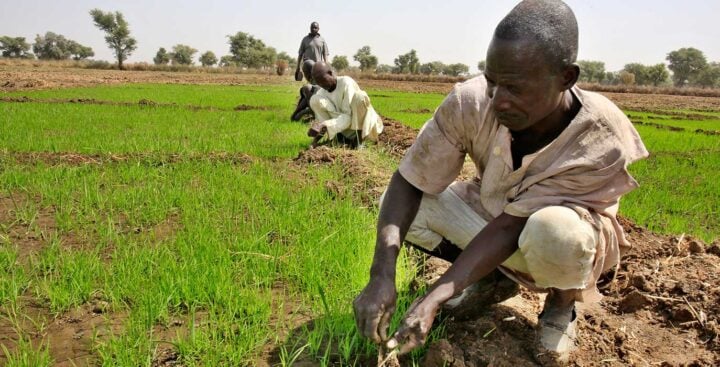BY OLUWADARA ALEGBELEYE
Like most people, I’ve long known that beans are good for you. They’re rich in fibre, protein, and packed with micronutrients. But in my twenties, I rarely ate them—unless I was visiting my parents. Even then, although I’ve always helped with cooking and domestic chores, I never volunteered to pick beans. I couldn’t and still cannot stand the tedious ritual of sorting out stones and dirt. So whenever I wasn’t at my parents’ house, I skipped beans altogether, health benefits or not.
In recent years, though, I’ve had access to pre-cleaned, destoned beans. No more sorting required, (hooray!) and I now eat beans about three times a week. The results? I feel noticeably better, but I’ve also lost around five kilograms—without making any other major lifestyle changes.
Do I attribute the weight loss solely to beans? That may be unreasonable, but I’m convinced that eating more of them has contributed meaningfully to my overall well-being.
Advertisement
In recent times, many Nigerians have decried our growing preference for often less healthy, Western-style food options.
Across social media, community forums and other platforms, many of us have encountered lengthy, impassioned reflections on the gradual, but persistent abandonment of our food heritage, and the very real consequences of that loss. These discussions, often heartfelt and informed, point to a growing awareness that what we eat is not just a matter of personal choice, but a collective public health issue.
I believe this is a welcome debate on a previously overlooked but critical aspect of our society. Over the past few weeks, therefore, I’ve taken time to engage with Nigerians across generations and walks of life.
Advertisement
While I respect the diversity of opinions shared, one thing is clear: most people agree that the gradual shift away from consuming traditional food is potentially harmful. There’s a broad consensus that this shift may carry serious, long-term consequences for our health, culture, and national identity.
What’s less widely acknowledged, however, is the role that poor food technology and outdated postharvest systems have played in accelerating the erosion of our traditional food practices. It’s not that people are unaware of the dangers — they are, or at least seem to be. The real disconnect, as I have observed, is in understanding how the slow pace of innovation in Nigeria’s food sector has left many with few convenient, healthy options. And that, I believe, is why we’re having this conversation in the first place.
I have written about this dietary shift before, but I am beginning to wonder whether my previous article took an inordinately simplistic stance, and whether this trend might be driven, even slightly, by sheer convenience?
Many traditional Nigerian meals– beans, moi moi, ekuru, tuwo, amala, and even “simple” soups like ewuro (bitter leaf soup) —are time-consuming to prepare. Ingredients are often unprocessed, cooking is from scratch, and the steps are laborious. I mean, basic staples like beans still frequently contain foreign matter such as stones, chaff, and pebbles, which still need to be picked out by hand. Consequently, most modern families simply can no longer find the time to prepare these meals.
Advertisement
Though this remains to be rigorously tested and documented in the Nigerian context, when fruits, vegetables, legumes, and roots are seen as too burdensome to prepare, they tend to be replaced with shelf-stable imports or fast food.
It seems clear to me that we need to begin to invest in food science and technology research and development.
There isn’t enough space here to explore every promising technology for scaling food processing and production into more convenient staples. If there were, I’d have loved to touch on the many approaches we could pursue to make healthy eating more accessible and reduce the time and labour burden, especially for women.
Given the need for brevity, a good starting point is innovation in automated destoning and similar technologies. Tools that are simple, locally adaptable, and able to drastically reduce the time and tedium involved in processing foods like beans, millet, and egusi should, in my view, be a priority.
Advertisement
Some of these tools likely exist, but judging by how many Nigerians still buy unsorted beans at the market, they remain on the margins. They need to be funded, scaled, and better connected to national policy.
Contemporary packaging methods like Modified Atmosphere Packaging (MAP) and vacuum sealing are also worth adopting, particularly because they address both shelf life and convenience. When adapted properly, these technologies can preserve traditional vegetables like ewuro in ready-to-cook formats.
Advertisement
Optimisation must, however, go beyond convenience. Packaging should be designed to protect organoleptic qualities, preserve bioactive compounds, and avoid creating environments that support pathogen growth.
If you’re worried that modernising our food systems or introducing these technologies might erode their soul, I’d say there’s little cause for concern. From a scientific standpoint, technologies like MAP or vacuum sealing are not invasive. They’re inert, non-chemical interventions that create controlled storage environments, mostly with the goal of slowing respiration and microbial growth. Likewise, automated destoning or dehydration simply reduces drudgery.
Advertisement
That said, not all technologies are inherently suitable for our food systems. The indiscriminate transfer of tools and models from Western contexts may disregard the unique textures, perishability, cultural connotations, and informal economies that are germane to how food is grown, processed, sold, and consumed in our society. A vacuum-sealed ewedu is not the same as a vacuum-sealed bag of spinach, and a mechanised fufu press designed abroad may not achieve the desired viscosity or texture if used to process our local cassava varieties.
If modernisation is to serve us, therefore, it should be appropriately rooted in local knowledge—technologies must be adapted, not adopted wholesale. This means investing in homegrown food technologists, product developers, engineers, and entrepreneurs who understand not just the science, but the entire essence of the foods they’re working to preserve.
Advertisement
So, I was not eating beans all this time, despite knowing their health benefits. How many others are in the same position, skipping a nutritious staple because they have better things to do than sort through foreign matter? How many still lack access to pre-cleaned or destoned beans? (I bought the packs I have currently at a high-end supermarket, and they were not cheap.) Do people in the rural areas have access to such luxury? Are there any tangible links between such gaps and poor nutrition or public health outcomes?
In my view, this is more than sufficient reason to begin to prioritise investment in food technologies and innovations that meet our needs and reflect our realities.
Oluwadara Alegbeleye is an academic researcher whose work explores food and water safety, as well as sustainable food production.
Views expressed by contributors are strictly personal and not of TheCable.




